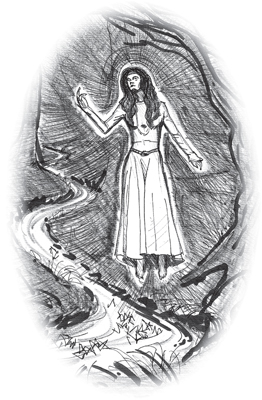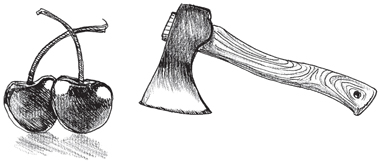Oxfordshire Folktales (15 page)
Read Oxfordshire Folktales Online
Authors: Kevan Manwaring

‘Amy … is that you?’
It was the very image of his late wife and yet there was something about her that was unnatural. The way she stared so; the angle of her neck; the pallor of her skin. She pointed at Robert – rooting him to the spot. ‘Husband, my grave is cold. You will join me, ten days’ hence, to warm it in your winding shroud.’ And then she vanished. Robert tried to laugh it off. Surely it was just a pool of sunlight through the trees? The Master of the Horse remounted and rode off. Thinking to himself nothing broken; no harm done.
And yet, ten days later, Amy’s prophecy came true. On the 4th of September 1588, exactly ten days after seeing the ghost – for surely that is what it was – Robert Dudley, Earl of Leicester, died; the cause of death a mystery.
![]()

Amy’s ghost is said to have appeared at Cornbury several times since these tragic incidents, warning again of sudden death. The house was pulled down in 1810, ‘because her ghost gave the locals so much trouble.’ The tragic tale of Robert and Amy appears to have been recorded in a popular ballad, originating around 1736-63, entitled
The Oxfordshire Tragedy
, or
Near Woodstock Town
:
Alas! quoth she, my love’s unkind,
My sighs and tears he will not mind,
But he is cruel unto me,
Which causes all my misery.
Soon after he had gained my heart
He cruelly did from me part;
Another maid he does pursue,
And to his vows he bids adieu.
The green turf served her as a bed,
And flowers a pillow for her head;
She laid her down and nothing spoke,
Alas! For love her heart was broke.
Soon after was the squire possessed
With various thoughts that broke his rest,
Sometimes he thought her groans he heard,
Sometimes her ghastly ghost appeared.
‘Since my unkindness did destroy
My dearest love and only joy
My wretched life must ended be;
Now must I die and come to thee!’
His rapier from his side he drew
And pierced his body through and through,
So he dropped down in purple gore
Just where she did some time before.
He buried was within the grave
Of his true love – and thus you have
A sad account of his hard fate,
Who died in Oxfordshire of late.
T
HE
O
XFORD
S
TUDENT

There was once an Oxford student who wooed the daughter of a local brewer of the town. Famed for her looks, she was regarded as the comeliest wench to serve a flagon of ale and brought customers flocking to her father’s hostelry. She was not dismissive of the scholar’s attentions and they began courting, one thing led to another, and the inevitable happened – the student got her with child.
She pressed him to marry her, to make an honest woman of her – something he, with sly tongue, always put off while convincing her of his sincere intentions and undying love. But, at last, he said that if she would meet him at Divinity Walk the next moonlight night, he would arrange it.
So, early on the night of the next full moon, the brewer’s daughter set out for the open orchard land that bordered Divinity Walk in those days. She was very early, so for safety – for they were rough times – she climbed one of the apple trees and hid there. Presently she heard heavy steps, and saw her lover plodding up the hill with a spade across his shoulders. He came up to the very tree where she was hiding and began to dig a long, narrow, deep hole. Then he stood and waited with a dagger in his hand and a dark look upon his face. But the girl, lying along the branch above him, never stirred, and at length he went away, and she ran as fast as her feet could carry her back to her father’s house. Next day, as she was going down Brewer’s Lane, the student saw her, and greeted her lovingly. Up piped the brewer’s daughter, who sang:
One moonshiny night, as I sat high,
Waiting for one to come by,
The boughs did bend; my heart did break,
To see what hole the fox did make.
As she sang her strange song, the student whipped out his dagger and, stunning her into silence, stabbed her deep in the heart.
The villain fled, leaving the broken body of his victim, her heart weeping blood.
It was well known about the affection the brewer’s daughter had for this scholar, for she did nothing but talk of it to her friends, and it was not long for the prime suspect to be identified.
When news of this scandalous murder got out there was the greatest fight between town and gown that ever was known: Brewer’s Lane ran with blood. The cruel student was killed in the melee; the mob were sated, their brutal justice administered – but nothing would bring the poor girl back to life.
They say she was buried in the very grave that was dug for her by her false lover – the final resting place of the brewer’s daughter.
![]()
This tale was derived from Halliwell’s
Nursery Rhymes and Tales.
The nefarious student here is the type mocked in the ballad
The Oxford Scholar
(1813–29). One of the verses seems particularly apt:
A servant maid I always kept
To sweep out my study and chamber,
I could kiss her when I liked
Because I could command her;
But sure such havoc I did make
Withal to dress my honour,
I was a most wild and extravagant rake,
When I was an Oxford scholar.
W
ASHINGTON
AND
THE
C
HERRY
T
REE

George loved his hatchet – the way it felt in his hand, the carved wooden handle, the sharp cold edge which he would nervously run his finger along. Holding it, he felt like a Big Chief – although in fact, he was only six. He ran through the leafy grounds of Sulgrave Manor, his family home, hollering Apache-style and scaring the bejeezus out of squirrels. This was his tribal territory, and he was master of it – a fearsome scout. Nothing moved here without his knowledge. The comings and goings of his family; their visitors; the servants; the workers in the fields – he would watch them in secret from one of his hide-out trees. The people, the animals, the buildings and fields – why, it seemed to be a perfect corner of God’s kingdom. Everybody and everything seemed to have its place, its role, and yet some things seemed … less equal than others. As a six-year-old boy he was painfully aware of this. Although he was his father’s son, he was still low down the pecking order. People talked over his head as though he wasn’t there! His hair was ruffled, his cheek was pinched fondly, an old lady would give him a sweet, a man would bounce him on his knee, but he felt like he was some kind of pet. Why couldn’t he be treated the same as the older boys – the farmhands, the servants – given roles and tasks and taken seriously?
A redskin in his rage, he leapt down and ran until he came to his father’s favourite cherry tree – a fine young specimen it was. What drew him to it, he could not say, but before he knew it he was striking into it with his small axe in vexation. He. Wanted. To. Be. Equal. The hatchet made a satisfying thud each time, and gouged out a V of bark. He followed this line around the trunk until he had made a pale ring. He looked at it with pride, breathing hard. He wiped the sweat from his brow with his sleeve. His anger had passed, but at what price? A sick feeling in his guts made him run back to his den. For a while he brooded there, but his stomach growled. He couldn’t be an outlaw for long. He had to go and hand himself in.
George left his ‘mountain fastness’ and returned to the main house, expecting to be clapped in irons. Yet everyone went about their business as usual. In the kitchens, he filched a cookie, fresh from the oven, and ran off before the cook could scold him. He seemed to have got away with it!
Then, a couple of days later, his father returned from business and was informed of the fate of his favourite cherry tree; that some thoughtless vandal had barked it. In fury, he called the servants to the main hall, had them all line up, and paced back and forth, waiting for the guilty culprit to confess. They held their heads in what seemed to be shame. ‘Who has done this deed? It must be someone within our walls, for no other is admitted onto our grounds.’ None of the servants spoke up, but they quaked in their boots.
George couldn’t stand it any longer. He had been standing to one side, with his family, watching the whole spectacle. His father had insisted they were present – an attack on the cherry tree was an attack on the Washingtons. Still no one spoke.
‘No one leaves this room until the guilty person owns up. If you are hiding the suspect, or have knowledge of him, then speak now, or you too shall be for the chop.’
One of the maids stifled a giggle. The housekeeper scowled at her. Just then George, with his little hatchet in his hand, stepped forward, shaking a little, but he tried not to show it.
‘Yes, son, what is it? Can’t you see I’m busy?’
George plucked up his courage and finally blurted out his shameful confession, ‘I cannot tell a lie, father. I did it!’
